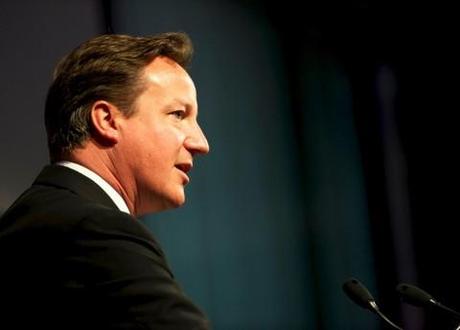
Prime Minister David Cameron. Photo credit: DFID
UK Prime Minister David Cameron effectively vetoed a European Union agreement that would essentially institutionalize a two-speed Europe in an attempt to closer integrate eurozone member nations’ fiscal movements, tighten budget regulations and rebuild market confidence in the euro. The move, critics say, further isolates Britain from the EU, a claim that Foreign Secretary William Hague brushed off.
Cameron refused to sign the change to the Lisbon Treaty, which governs the running of the EU, during an emergency EU summit meeting Thursday. The PM had gone to Brussels with the express purpose of wielding Britain’s agreement to protect Britain’s financial sector from exacting financial transaction taxes. It didn’t work and French President Nicolas Sarkozy, one half of the Franco-German power couple Merkozy that appears to be running the show, blasted Cameron for making “unacceptable” demands for UK exemptions. Cameron later told a press conference that the deal was not in Britain’s best interests to sign on to a “treaty within a treaty” that would sacrifice the nation’s financial sovereignty, so he declined it. Of the other non-euro nations in the EU, Hungary, sided with Britain, while Sweden and the Czech Republic remain undecided. All of the eurozone members signed on, as did six other nations who want to join the currency union some day.
Markets have reacted poorly to the news of the British veto, This is Money reported: The FTSE, the French CAC and the German Dax all fell in first trade Friday morning, though fluctuation throughout the day was expected.
So, where do the cards lie now?
The UK’s veto is a game-changer – expect legal rows galore. “For years people have talked about a British veto. For years it has existed as a threat never used. Not any more,” Nick Robinson, the BBC’s political editor, intoned ominously. “The consequences could scarcely be greater for Europe and for Britain’s relationship with Europe.” Squabbles over the legality of this “new euro club-within-a-club” are sure to arise; those safeguards for the City Cameron wanted but didn’t get will also be a sore spot; and Tory Eurosceptic types will now demand a renegotiation with the EU, putting them on a collision course with their Lib Dem coalition partners.
“We wish them well,” Cameron said after the break-up. “My judgment was that what was on offer just wasn’t good enough for Britain. It’s better to allow those countries to do their own thing on their own.”
Consequences for Cameron. Cameron is in a sticky place, though he’s likely to be hailed as a conquering hero by the Eurosceptics in his party, possibly the City for his attempt to safeguard their interests, and, Patrick Wintour at The Guardian claimed, much of the British press. “But he faces the risk of becoming the scapegoat if the euro does collapse, a consequence with huge diplomatic consequences, probably leading to a further recasting of Britain’s relations with the EU.” Euro leaders are likely to claim that in their time of need, Cameron turned away; moreover, alienating the Franco-German power alliance means that Britain will be out of the room when the big decisions are made.
Playing poor politics. Both Cameron and German Chancellor Angela Merkel, fellow architect of the treaty changes, are convinced they’re playing “clever national politics”, but in fact, The Guardian claimed in a leading editorial, they’re just “playing poor European ones”. Merkel has the “wrong diagnosis” – the euro problem is a banking one, not a fiscal management one, and further integration of the eurozone nations’ fiscal decision making just postpones a decision about who’s going to pay for all this debt. And Cameron has just succeeded in cutting Britain out of the decision-making, leaving German and France to call the shots. “The reality is that a two-speed Europe, or various parts of Europe traveling at different speeds, is already more than halfway down the slipway.”
Wrong solution. The Times (£), in a leading editorial, agreed: New schemes for EU governance, no matter how much they play well domestically, will not actually resolve the debt crisis. “The cause of European integration has long been marked by soaring rhetoric when it would have been better served by concentrating on simple arithmetic,” the paper claimed. The only thing that’s left is for Greece to either leave the monetary union or “agrees that its budgetary requirements will be decided and fulfilled for a long time, probably decades, by other countries.”
Britain should join the euro. Despite Cameron’s evident siding with the Eurosceptics, Mary Dejevsky in The Independent claimed that Britain must join the euro and Cameron is just the man to make that happen. Cameron has long sat on the fence, wanting to call the shots about what happens in the eurozone, but not wanting to commit Britain to the monetary union; at the summit in Brussels, he’s got to figure out which side he wants to be on. Eurosceptics may clamour, “But Britain’s entry into the euro would, at a stroke, bring more money and – as the regulation of British banks improves – more financial stability into the European Central Bank, to mutual benefit.”
Britain and Hungary – an alliance? “Adversity makes strange bedfellows,” declared Stefan Wagstyl at the Financial Times’s BeyondBrics blog: Hungary and Britain’s mutual distaste for the changes to the Lisbon Treaty means that Cameron’s only partner is “the maverick Magyar”, Hungarian Prime Minister Viktor Orban. “The outspoken leader isn’t short of brains or political cunning. Nor is he ever slow to give advice. So he should have plenty to say on almost any issue of interest to Cameron from football (he’s played in a professional team) to the future of the European nation state.” The biggest problem for Britain, however, is that Hungary just isn’t very big.

